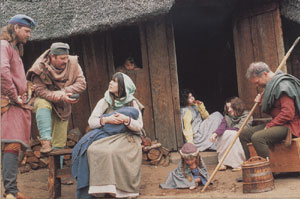 |
 |

|
to that of Roman Britain 400 AD to c600 AD
Comparison by Dr Stanley West
(Please click images to enlarge)
|
| LIFE IN ROMAN BRITAIN | LIFE OF THE EARLY ANGLO-SAXONS |
|---|---|
| Roman Britain had been part of a centralised Empire, with central government. | The early Anglo-Saxons depended upon their tribal structure for law and order. |
| The country was run by a bureaucracy. | There were no officials and no bureacracy. |
| All laws and decrees were recorded and codified in writing. | There was no writing and no written record. Laws were transmitted orally. |
| Literate individuals wrote histories and treatises. | All history was passed down orally, often as a saga or story. |
| The empire used money in the form of coinage. | There was no coinage or money used as a store of value. |
| The empire ran a standing army of paid professionals. | There was no standing army, or wages for fighting. |
| The economy supported specialist workers like smiths and jewellers. | Very few specialists. Perhaps only itinerant traders and bards. |
| There were organised industries selling their products. | No organised industries. |
| The empire had formal market places and shops. | The early Saxons had no market places. |
| Large scale farming and forestry were carried on. | Only small family farms existed. |
| Agricultural estates were normal. | No estates existed at this time. |
| There was a large agricultural surplus, available for sale and trade internationally. | Surpluses, if any, were in short supply. |
| Towns and cities were normal. | No Anglo-Saxon towns at this time, and they avoided existing towns. |
| Organised road building, bridges and other public works. | The Anglo-Saxons did not build roads or public buildings. |
| The Romano-British economy was complex and at least partly international. | A simple agrarian economy with subsistence farming was normal. |
| Religion was organised and intertwined with the state. | There was no organised Anglo-Saxon religion until Christianity arrived in the 7th century. |
| High status buildings could be built of stone, brick or concrete. | All building depended upon wood-working skills. |
|
Source This comparison by Stanley West is taken from his book entitled "Understanding West Stow", published in 2000. |
| Go to Anglo-Saxons homepage | Produced 3rd October 2009 | Go to Main Home Page |